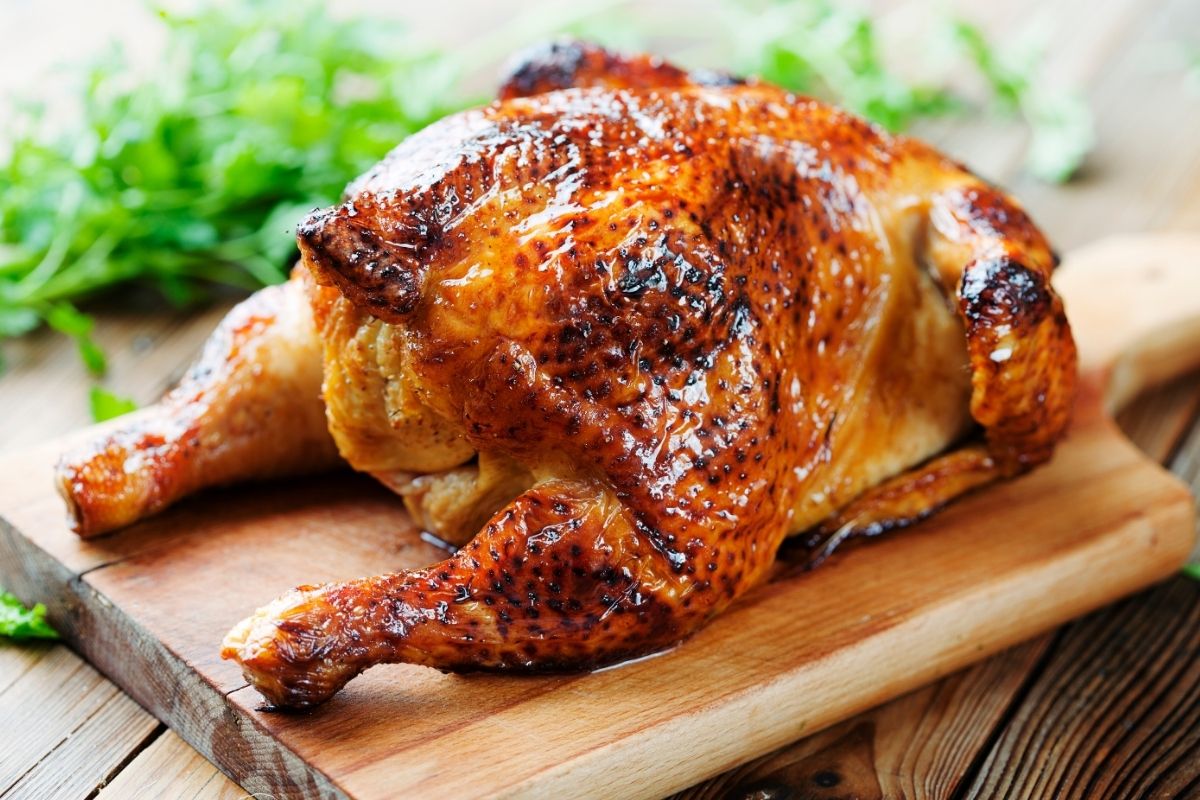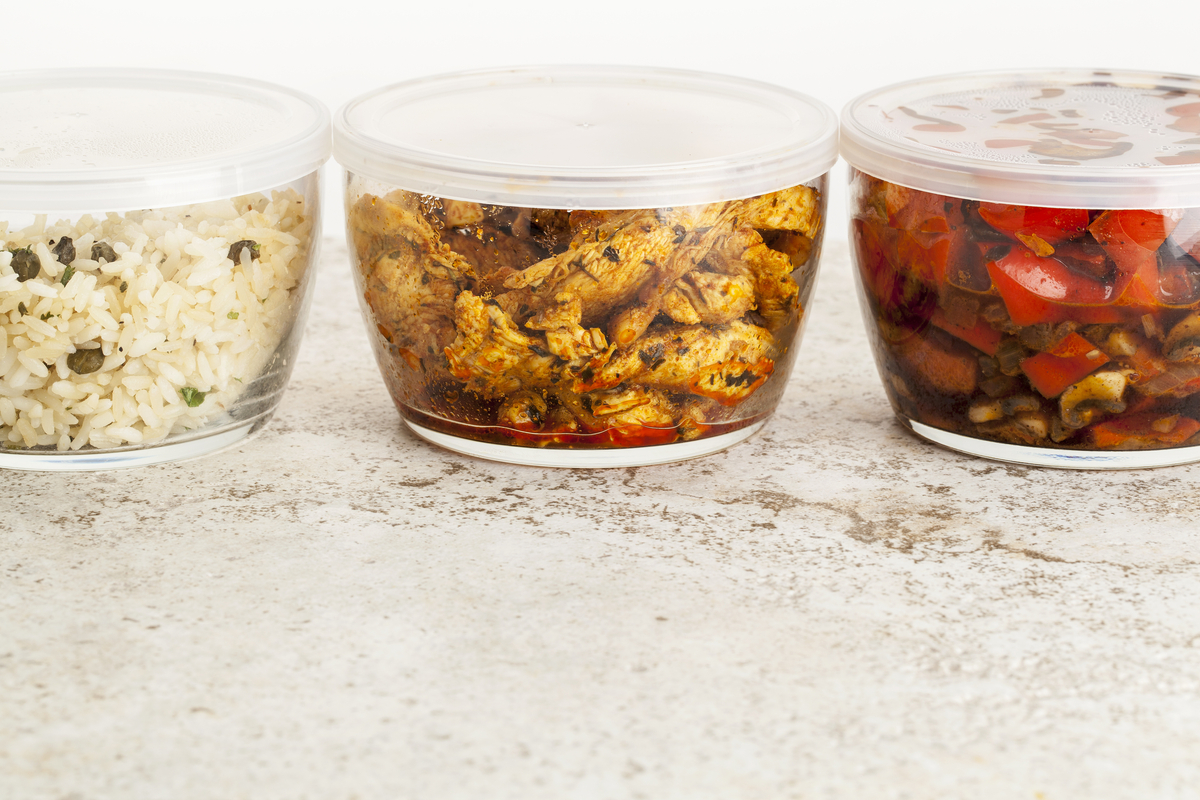It happens to the best of us, sometimes after a busy day and a rushed dinner, we forget to put the leftover chicken back in the refrigerator, but is there really any harm in eating the chicken that has been left out overnight?

We will cover this question including how it being cooked or raw influences things, how to store your chicken the right way, and signs that you need to look out for that will tell you that your chicken needs to be thrown out.
Can You Eat Chicken That Has Been Left Out Overnight?
Even though it’s easier to brush off the fact that the chicken has been sitting out overnight, you really shouldn’t eat it. It may look and smell normal but if you eat it you are putting yourself at risk of getting food poisoning or salmonella which we will talk about in more detail later on.
Any chicken that has been left out for more than two hours at room temperature, you need to throw it out.
The safest thing to do is put the chicken in the refrigerator within two hours but if the temperature is higher than 90 degrees Fahrenheit then you should put the chicken in the refrigerator within one hour.
It is a common myth that you can kill the dangerous bacteria by cooking the chicken even after it has been left out, but some bacteria have the ability to produce toxins that are heat-resistant. You cannot see these bacteria with the naked eye so throwing them out is always the safest option even if it looks fine.
If the chicken has been covered for the entire time it was left overnight, it will prevent airborne debris such as dust and hair from settling on it.
Unfortunately, if the room temperature is anywhere between 40- and 140-degrees Fahrenheit then the bacteria will still be able to develop on the chicken.
Leaving raw chicken overnight before cooking and eating it is even more dangerous and should be stored in the refrigerator. It can be left out for no longer than two hours at room temperature but being left out any longer will result in it needing to be thrown out.
Thawing Chicken
You should never thaw chicken by simply taking it out of the freezer and leaving it on the countertop whether it’s for a few hours or for overnight. This is because the temperature will not stay cold enough to prevent the production of dangerous bacteria.
To thaw your chicken safely, you should put it in the refrigerator so that it stays within the safe temperature levels.
Doing this will take about 24 hours so planning ahead is very important in order to prevent you from needing to take the shortcut of thawing it at room temperature – as this is faster but more dangerous!
For a quicker way to thaw chicken without putting yourself at risk of getting ill, you can put it in a cold water bath. You must check that the package holding the chicken is completely sealed and every 30 minutes, the water should be changed.
Depending on the size of the chicken, it can take between one and three hours for it to thaw, and keep in mind that you must cook it straight away after it has been thawed using this method.
Why You Need To Put Your Chicken In The Refrigerator
Storing chicken in the refrigerator is very essential because the meat can host bacteria that can lead to illnesses such as food poisoning and salmonella. An environment below the temperature of 40 degrees Fahrenheit at all times will stop these bacteria from manifesting.
By cooking the chicken past 140 degrees, you are also able to put a stop to these bacteria but once the chicken cools down, the bacteria can build up again. This is why both cooked and raw chicken needs to go into the refrigerator.
Storing Your Leftover Chicken Properly

The best way to store leftover chicken is to put it in a sealed container or zip-top plastic bag with the excess air squeezed out as soon as you’re done eating, but if it has not been put in the refrigerator after two hours, it is too late.
Store the meat on the lowest shelf in your refrigerator whilst also keeping it away from the door as this can lead to a fluctuation in temperature every time the door is opened.
If you follow these steps, you can expect the chicken to last up to four days but if you make it to day three and don’t see yourself eating it anytime soon, you should put it in the freezer.
But before freezing, it is best to check that it is sealed tightly and label it with what it is and when it was put in the freezer. In the freezer, the chicken will last between four and six months, but you need to throw it out if you see the texture of the chicken start to deteriorate.
How To Know When You Need To Throw Out Your Chicken
So, how do you know when you need to throw out the chicken? As mentioned earlier, any chicken whether cooked or raw needs to be thrown out if it has been left at room temperature for more than two hours.
However, even meat that has been stored in all the right ways will eventually go off and the signs of this include a sour smell coming from the chicken, green and gray patches, fuzzy skin, and a texture that feels sticky and slimy.
If you see or smell any of these signs, the chicken should not be eaten and instead needs to go in the garbage.
What Happens If You Eat Chicken That Has Gone Off?
If you eat chicken that has gone off or has developed dangerous bacteria, you might suffer from either food poisoning or salmonella which can land you in hospital if you get a particularly nasty case of it.
Food Poisoning
If you eat contaminated food, you might get an illness called food poisoning which is also known as foodborne illness.
It is usually caused by infectious organisms such as parasites, bacteria, viruses, and toxins which can contaminate food during the processing or production stage as well as at home if it is not stored or cooked properly.
The symptoms of food poisoning will not typically show for a few hours or even days after eating the contaminated food, but once it begins, the common symptoms include diarrhea, nausea, and vomiting.
Even though these symptoms are very unpleasant, most cases of food poisoning are rather mild and will resolve on their own in a day or two without any treatment.
If you have mild food poisoning, then you should drink a lot of water to prevent dehydration, avoid solid foods until you feel better, and rest as much as you can.
Food poisoning can sometimes be more severe and if you experience symptoms such as frequent vomiting and vomiting with blood in it, not being able to hold down water, diarrhea lasting more than three days, and lots of pain and cramping in the abdominal area then you will need to go to the doctor.
Salmonella
Salmonella is a disease that affects the intestinal tract that is shed through feces in both animals and humans which are then infected mostly through food or water that has been contaminated.
Salmonella bacteria are usually found in raw meat, undercooked poultry, eggs, and unpasteurized milk.
Some people do not suffer from any side effects of salmonella, but others might get abdominal cramps, diarrhea, and a fever that can begin to show after eight to 72 hours of eating the contaminated food.
The symptoms are very similar to food poisoning and most people will be fine if after a couple of days without needing to seek treatment.
However, sometimes the salmonella infection can be more severe, and the person suffering can get so dehydrated from the vomiting and dehydration that they will need to to go to the doctor.
Even if you had a mild case of salmonella, it can take a few months for your bowel to get back to normal.
Summary
You should never eat chicken that has been left out overnight, even if you were marinading it, or it was a particularly cold night because you do not know for sure that the temperature did not fluctuate and reach anywhere from 40 to 140 degrees Fahrenheit.
To store leftover chicken properly, put it in a well-sealed container or bag and put it in the refrigerator within two hours of cooking it so that the bacteria doesn’t have the chance of developing into something sinister that will ruin your week if you decide to eat it anyway.
- The 9 Best BBQ Grills for Smoking Brisket - December 29, 2022
- 6 Mouth Watering Grilled Shrimp Recipes - September 16, 2022
- 6 Delicious Grilled Desserts - September 16, 2022
